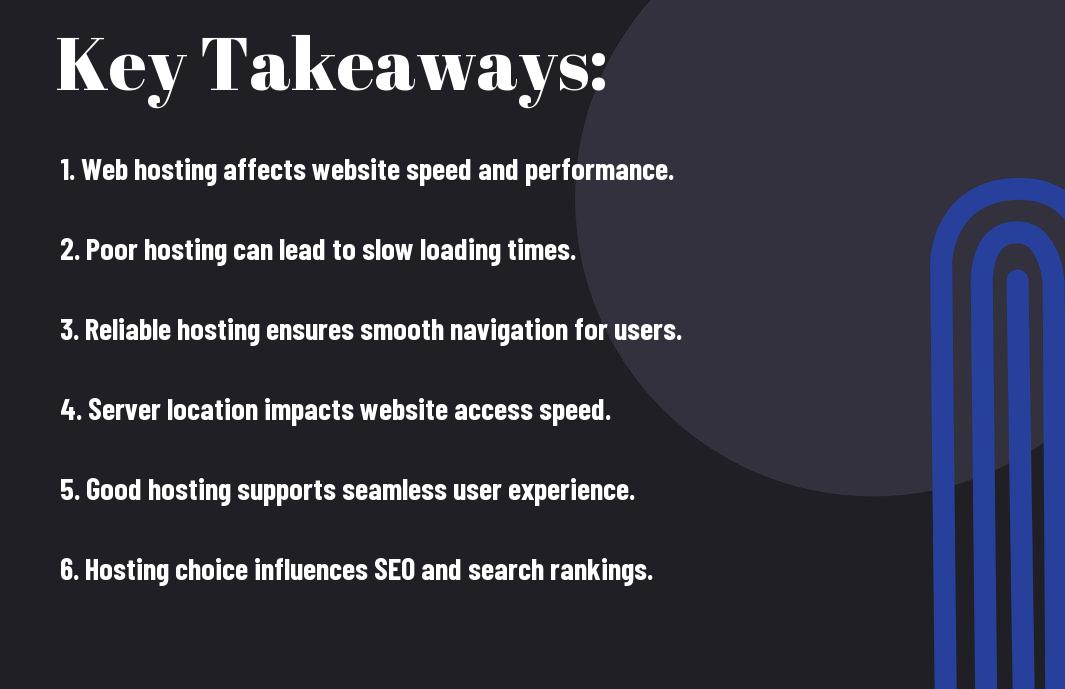Have you ever considered the critical role that web hosting plays in determining the quality of your website’s navigation? Whether you’re a small business owner, a blogger, or an online retailer, the reliability and speed of your web hosting can make or break the user experience on your site. Slow loading times, frequent downtime, and poor server performance can all lead to frustration for your visitors and result in them navigating away from your site. On the other hand, a robust and efficient web hosting service can lead to seamless navigation, quick page load times, and an overall positive user experience. In this blog post, we’ll delve into the ways in which web hosting can impact website navigation and provide you with insights on how to choose the right hosting service for your needs.
Key Takeaways:
- Website Loading Speed: Web hosting can significantly impact a website’s loading speed, affecting user experience and ultimately, website navigation.
- Uptime and Downtime: The reliability of web hosting directly affects a website’s uptime and downtime, which can impact user access and navigation on the site.
- Server Location: The physical location of the web hosting server can also influence website navigation, as it can impact the latency and responsiveness of the website.


Factors of Web Hosting That Affect Navigation
Some factors of web hosting can have a significant impact on the navigation of your website. Considering these factors is crucial to ensure a seamless browsing experience for your visitors. Here are some key considerations to keep in mind:
- Server Speed and Performance
- Uptime and Reliability
- Security Features
- Server Location
- Scalability
Knowing the influence of these factors on your website navigation will help you make informed decisions when choosing a web hosting service. If you want to learn more about the impact of web hosting on website performance, you can read our article on The Impact of Web Hosting on Website Performance.
Server Speed and Performance
When it comes to web hosting, the speed and performance of your server play a crucial role in determining how quickly your website loads and responds to user interactions. A slow-loading website can frustrate visitors and lead to a high bounce rate. Therefore, it’s essential to choose a hosting provider that offers fast and reliable servers to ensure a smooth browsing experience for your users.
Uptime and Reliability
The uptime and reliability of your web hosting service are vital for ensuring that your website is consistently accessible to visitors. Downtime can negatively impact user experience and hinder the overall navigational flow of your site. A reliable hosting provider will have measures in place to minimize downtime and ensure that your website remains accessible at all times.
Types of Web Hosting Solutions
For website navigation, it’s crucial to understand the different types of web hosting solutions available to you. Each type comes with its own set of features and benefits that can impact the performance of your website. Here are the main types of web hosting solutions:
- Shared hosting
- VPS hosting
- Dedicated hosting
- Cloud hosting
- Managed WordPress hosting
Any poor choice in web hosting can negatively impact the user experience of your website and potentially affect your search engine rankings. For more information on how hosting affects SEO and how to choose the best hosting for your website, you can check out this link.
| Shared Hosting | Best for small websites with low traffic, limited resources, and budget-friendly. |
| VPS Hosting | Offers a private environment with dedicated resources for improved performance and scalability. |
| Dedicated Hosting | Provides full control over server resources and configuration, ideal for high-traffic websites. |
| Cloud Hosting | Utilizes multiple connected servers for flexibility, reliability, and scalability. |
| Managed WordPress Hosting | Specifically optimized for WordPress websites with automatic updates and security features. |
Shared Hosting and Navigation Considerations
Shared hosting is a popular option for new websites and smaller businesses. It is a cost-effective solution that allows multiple websites to share a single server. However, the shared resources can lead to slower loading times and limited control over server configurations, impacting the overall user experience and navigation of your website.
Dedicated and VPS Hosting for Enhanced Control
When you opt for dedicated or VPS hosting, you gain more control over your server environment. This allows you to optimize your website’s performance and navigation by customizing server settings and allocating resources based on your specific needs. With dedicated and VPS hosting, you can ensure a smoother and more responsive user experience for your visitors.
Design and User Experience
Unlike other aspects of web hosting, the impact of hosting on website navigation is not limited to technical factors. The design and user experience of your website are heavily influenced by the speed, reliability, and security of your hosting. If your website is slow to load, has frequent downtime, or lacks security features, it can significantly affect how users interact with your site and ultimately lead to a poor user experience. It is essential to consider these hosting factors when designing and optimizing your website for a seamless navigation experience for your visitors.
Influence of Hosting on Website Load Time
When it comes to user experience, website load time is crucial. Slow loading websites can lead to high bounce rates and dissatisfied visitors. Your choice of web hosting can directly impact the speed at which your website loads. A reliable hosting provider with fast server response times and optimized infrastructure can significantly improve your website’s load time, ensuring a smooth and efficient navigation experience for your visitors. On the other hand, a subpar hosting service can result in sluggish performance and negatively impact your website’s user experience.
Content Management Systems and Navigation
Your website’s content management system (CMS) plays a significant role in how users navigate your site. The efficiency and reliability of your CMS depend on the hosting environment. If your hosting provider does not support or optimize the CMS you are using, it can lead to compatibility issues, security vulnerabilities, and overall poor navigation experience. Ensuring that your hosting service is compatible with and supports your chosen CMS is crucial for providing a seamless navigation experience for your visitors. A well-supported CMS running on a robust hosting platform can enhance the flexibility, functionality, and user-friendliness of your website, ultimately improving the overall navigation experience for your audience.
Strategies for Improving Navigation
To ensure smooth website navigation, you need to implement various strategies that can enhance user experience and keep visitors engaged. Here are some key strategies that you can use to improve navigation on your website.
Optimizing Hosting for Speed
Speed is crucial for effective website navigation. Slow loading times can lead to frustration and high bounce rates. To ensure that your website loads quickly, you need to optimize your hosting for speed. This includes choosing a reliable hosting provider, optimizing images and other media files, and implementing caching mechanisms to reduce load times. By ensuring that your website is hosted on a fast and reliable server, you can provide your visitors with a seamless navigation experience.
Best Practices in Web Design for Navigation
When it comes to website navigation, the design plays a critical role in ensuring that visitors can easily find the information they are looking for. Implementing best practices in web design for navigation, such as intuitive menu structures, clear call-to-action buttons, and a responsive layout, can greatly enhance the user experience. By optimizing your website’s design for easy navigation, you can reduce bounce rates and increase user engagement.
The Impact of Web Hosting on Website Navigation
Now that you understand the crucial role web hosting plays in website navigation, you can make more informed decisions when it comes to choosing a hosting provider for your website. The speed, uptime, and reliability of your hosting service are directly linked to the overall user experience and the success of your website. By investing in a high-quality hosting service, you can ensure that your website is easily accessible, navigable, and provides a seamless experience for your visitors. Remember to prioritize reliable hosting and to regularly monitor and optimize your website for the best possible user experience.
FAQ
Q: What is the impact of web hosting on website navigation?
A: Web hosting can significantly impact website navigation by affecting page loading times and overall site reliability. A reliable web hosting service ensures smooth and consistent access to web pages, resulting in a positive user experience.
Q: How does web hosting affect page loading times?
A: The quality of web hosting directly affects page loading times. Slow loading times can lead to frustrated users and higher bounce rates, negatively impacting website traffic and SEO rankings. Choosing a reliable web hosting provider with fast servers and ample bandwidth can help optimize page loading times.
Q: Can web hosting impact website reliability?
A: Yes, web hosting plays a crucial role in ensuring website reliability. Unreliable hosting can result in frequent downtime, causing inconvenience to users and damaging the reputation of the website. Opting for a reputable web hosting provider with high uptime guarantees can enhance website reliability.
Q: How does web hosting influence user experience?
A: The quality of web hosting directly affects user experience. A fast and reliable hosting service ensures smooth navigation and accessibility, leading to a positive user experience. Conversely, poor hosting can result in slow loading times, downtime, and a frustrating user experience.
Q: What are the key factors to consider when choosing web hosting for optimal website navigation?
A: When selecting web hosting for website navigation, it is essential to consider factors such as server speed, uptime guarantees, bandwidth, customer support, and scalability. Opting for a reputable hosting provider that meets these criteria can significantly impact website navigation in a positive way.
CATEGORY:Uncategorized

